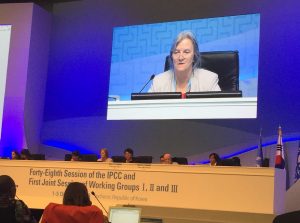Climate Service Center Germany (GERICS) discuss latest understandings on climate change and how the outcome has never been so plain to see
“Never before has scientific insight been so clearly confirmed as to what consequences climate change has so far had and what could result from a further increase to 1.5°C or 2°C,” stated Professor Daniela Jacob, director of the Climate Service Center Germany (GERICS) and Coordinating Lead Author of the Chapter on ‘Impacts of 1.5°C global warming on natural and human systems’ in the Intergovernmental Panel on Climate Change (IPCC) Special Report on Global Warming of 1.5°C (SR1.5). This Special Report identified the differences which would arise at 2°C as compared to 1.5°C in terms of impacts on environment and human societies, on emission pathways that would lead to these warming levels, on technological feasibility, and on synergies and trade-offs between climate mitigation and adaptation measures and the relationship with the ‘Sustainable Development Goals’.
Half of a degree celsius matters
The SR1.5 has some key messages to tell. Scientific evidence clearly shows that, due to the non-linearity and the risk of crossing tipping points in the Earth system, every tenth of a degree counts in terms of mitigating climate warming. Thus, every bit of warming that can be avoided is a benefit and will help to build up a sustainable future for all; providing strong arguments for taking climate action and push forward mitigation policies. The arguments become stronger when the costs for adaptation are considered in socio-economic planning; from an economic point of view, it is much more sensitive to dampen climate warming as strong and fast as possible despite the costs this implies, as every bit of additional warming will lead to substantially higher costs in the future.
“Until now, we researchers didn’t know exactly how different the risks between 1.5°C and 2°C worlds actually are”, reported Prof. Jacob at the conclusion of the 48th plenary session of the IPCC in Korea where 195 member states approved the SR1.5. The SR1.5 demonstrated that limiting global warming to 1.5°C is possible – if greenhouse gas emissions can be reduced drastically and fast – and that this could go hand in hand with better living conditions for many.
We can still avoid exceeding 1.5°C

The SR1.5, which was requested through an invitation from the United Nations Convention on Climate Change in 2015 (COP21) in Paris, should be one of the most important inputs for the negotiations to take at the COP24 in December 2018. The report is the most recent and comprehensive scientifically based compilation of knowledge on the effects of 1.5°C and 2°C warming and on the opportunities member states can take in order to avoid exceeding the 1.5°C target.
Climate change is unavoidable. The extent to which climate change will affect societies is determined by the political will that decides on mitigation and adaptation strategies implemented.
Climate services can help identify mitigation and adaptation strategies that will alleviate risk and provide methods to adapt to climatic stress, in sectors such as renewable energies, agriculture, and transport infrastructure and technology. Climate services offer climate knowledge, data and its interpretation on the level that best fits to the users’ needs, being that a country, a community or city, or a specific business. Its strength is to generate tailored products and solutions in a dialogue-based way, jointly with the user, without abandoning current living standards.
Mitigation and adaptation will be less costly and more widely accepted if it is addressed as early as possible. The SR1.5 has shown once more that emissions of greenhouse gases need to be curbed dramatically and immediately despite the fact it will not guarantee that warming will halt at 1.5°C, or even 2°C. On a positive note, however, the SR1.5 shows that many paths are possible, and that mitigating climate warming can give momentum to a change.
GERICS’ involvement in the SR1.5
In Hamburg, Germany, GERICS staff members have been involved in the compilation and review of the climate impacts chapter of the SR1.5, as well as in the production of attendant material on the GERICS web page and in printed formats. Information on GERICS activities pertaining to the SR1.5 are compiled here: www.gerics.de/IPCC-SR1.5
For more information, visit www.climate-service-center.de or view the stakeholder content
Authors:
Dr. Swantje Preuschmann, mail: swantje.preuschmann@hereon.de
Dr. Tanja Blome, mail: tanja.blome@hereon.de








